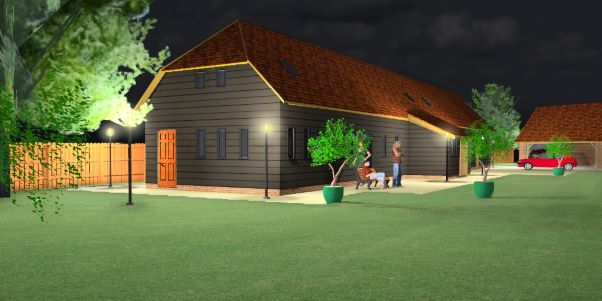The ever-changing world of planning means that Land and Property Professionals, Robinson & Hall, always have plenty of updates to share with you. We have highlighted some of the latest changes below:
Permitted Development Rights
The Government periodically reviews Permitted Development Rights for properties with a view of simplifying the planning process and speeding up development. It is important to monitor these changes as they can often provide a good opportunity to add value to your property and create an additional revenue stream.
Some of the most notable points that you can take advantage of include:
1. Part 3, Class P – Permits the change of use of a building from a storage and distribution centre to a dwelling. These rights can only be exercised provided that prior approval is given, or deemed to be given, before the 10th June 2019 and subject to the condition that development is completed within three years from the date of the prior approval or deemed approval and the building cannot exceed 500m² in floor area. However, the Government has signalled an intention to make these rights permanent.
2. Part 3, Class Q – Conversion of agricultural buildings to residential use. The existing floor space in agricultural use that can be changed to residential use was increased from 450m² to 465m² and the number of dwellings increased to three large homes or five small dwellings.
3. Part 3, Class R – Change of use of agricultural buildings to flexible commercial use. The agricultural building needs to have been solely in agricultural use on the 3rd July 2012. The total cumulative floor area must not exceed 500m². The building must not be listed (or within the curtilage of a listed building), a scheduled monument, form part of a safety hazard area or an explosives storage area.
4. Part 6 – Agricultural and forestry development on units of five hectares or more. New agricultural buildings, extensions or alterations are now permitted up to a maximum of 1,000m².
The Planning & Development team at Robinson & Hall can assist you to keep up to date with these changes and work with you to identify which Permitted Development Rights you may benefit from.
Local Plans
• Bedford Borough Council – the Local Plan was submitted to the Planning Inspectorate in December 2018 and hearing dates commence on 29th May aiming for adoption in Autumn 2019
• Central Bedfordshire Council – the Local Plan was submitted to the Planning Inspectorate in April 2018 and hearings set in May and June 2019 with a view to adoption in early 2020.
• Milton Keynes Council – Plan:MK was formally adopted on 20th March 2019. A part review of the Plan is to commence within 6 to 12 months with a view to a new Local Plan being adopted in 2022/2023.
• Aylesbury Vale District Council – the Inspector has not yet found the Plan sound and significant modifications have been identified. No forward timetable has been published.
Given the centralised location of these Council areas within the Oxford to Cambridge Growth Corridor, we are expecting early reviews of the soon to be adopted Local Plans. This should provide an opportunity to submit potential sites for housing and employment as part of the Councils’ Call for Sites process within the next 12 to 18 months.
Any changes with Neighbourhood Plans?
Due to our region’s central location in the Growth Corridor, we anticipate an increasing number of Neighbourhood Plans coming forward as Parish Councils and Neighbourhood Plan Groups seek greater control over the location of new homes and jobs. It is important to engage with local communities at an early stage in the production of Neighbourhood Plans.
Robinson & Hall’s Strategic Planning team has considerable experience in the successful promotion of land for development via the Neighbourhood Plan route. Please contact a member of the team for an informal discussion.
Is renewable energy still worth investing in?
Renewable energy remains an important contributor to overall energy generation, and with continued housing growth, the need for renewable/low carbon energy sources will become increasingly important. Projects involving renewable energy often can provide valuable opportunities for rural diversification allowing farming operations to continue, with land returned to agricultural use after decommissioning.
The National Planning Policy Framework (NPPF) recognises the need for renewable energy and low carbon sources and encourages Local Planning Authorities to support projects which involve energy from renewable sources. Local Plans have been required to identify areas suitable for future renewable energy developments. The emerging Local Plans in this region all include supportive policies in this regard. Large scale schemes are encouraged providing there are no adverse social, economic or environmental impacts associated with the development.
The NPPF also recognises the role of small-scale projects which can provide a valuable contribution. As an example, battery storage facilities can, subject to National Grid approval, offer invaluable opportunities for income generation whilst only requiring a relatively small land area.
Following the removal of government tariffs, the demand for renewable energy projects has reduced. However, public perceptions of renewable energy developments remain positive, in particular where the development, such as solar farms, can be well screened to mitigate the visual impact. With the reduction in panel costs and improved efficiency, solar farms are once more able to demonstrate viability and we are starting to see revived interest from solar energy companies in this area.
In addition to the land based renewable energy projects, many domestic renewable energy resources can be implemented without the need for planning permission through Permitted Development Rights e.g. Air Source Heat Pumps and Ground Source Heat Pumps (outlined within Part 14 of schedule 2 of the General Permitted Development Order). The government provides financial incentives to encourage the use of domestic heating from renewable sources with the Renewable Heat Incentive payment scheme.
If you consider your land has the potential to benefit from opportunities within the renewable energy sector, please contact Robinson & Hall’s Planning & Development team for an initial chat.
Call or email Andrew Barr, Head of Planning & Development on 01234 362926 or email ahb@robinsonandhall.co.uk
Call or email Abel Bunu, Senior Planner on 01234 362891 or email ab@robinsonandhall.co.uk
Call or email Alice Lawman, Assistant Planner on 01234 362913 or email ael@robinsonandhall.co.uk




![The Bedford College Group logo [WHITE]](https://www.chamber-business.com/hs-fs/hubfs/The%20Bedford%20College%20Group%20logo%20%5BWHITE%5D.png?width=139&height=81&name=The%20Bedford%20College%20Group%20logo%20%5BWHITE%5D.png)
